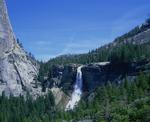Yosemite National Park Advises Visitors of Quarantined Wood
In an effort to prevent the introduction of the Sudden Oak Death (SOD) pathogen into Yosemite National Park, the Park urges travelers to follow existing quarantines of host material from the SOD-infested coastal California counties, reminding them that they are not allowed to bring firewood, soil, or plants from those areas into Yosemite National Park.
Sudden Oak Death, caused by the pathogen Phytophthora ramorum, affects over 105 known species. Hosts such as black oak, live oak, maple, azalea, bay laurel, buckeye, and tanoak are important tree and shrub species in approximately one-quarter of Yosemite's forest and woodland areas, and two-thirds of Yosemite's developed areas. Yosemite is reported to have the southernmost tanoaks in the Sierra Nevada.
This disease has been decimating woodlands and forests along the Central California Coast and the State and Federal governments have imposed quarantines to slow the spread of this non-native disease, including host plant material and soil from Alameda, Contra Costa, Humboldt, Lake, Marin, Mendocino, Monterey, Napa, San Francisco, San Mateo, Santa Clara, Santa Cruz, Solano, and Sonoma Counties. While scientists think that Sudden Oak Death might not ravage vegetation at Yosemite, so far from the coast, related species of Phytophthora have been found in Yosemite Valley, indicating that Sudden Oak Death could become established in Yosemite's forests and woodlands. Global climate change models indicating warmer, moister California weather might also indicate spread of new diseases.
Coastal residents or visitors who intend to camp or stay in lodges, cabins, or homes within Yosemite are encouraged to take special precautions when traveling to the park. Before going into uninfested areas, clean soil and mud off of shoes, bikes, vehicles and tires. Do not bring in firewood or potted plants from infested areas.
For more information about Sudden Oak Death or with questions about the quarantine, please contact the Public Information Office in Yosemite National Park at 209 372-0200.
Re: Quarantined Wood
All posts are those of the individual authors and the owner
of this site does not endorse them. Content should be considered opinion
and not fact until verified independently.
Sorry, only registered users may post in this forum.


